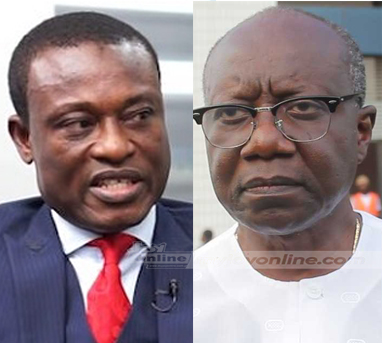The Director of Strategy, Research and Communication at the Office of the Special Prosecutor (OSP), Sammy Darko, has rejected calls to proceed with a trial in absentia for former Finance Minister Ken Ofori‑Atta.
According to him, such an approach would not align with legal procedure.
Earlier on Monday, private legal practitioner Martin Kpebu called on the OSP to initiate a trial in absentia if Mr. Ofori-Atta fails to return to Ghana to face possible prosecution.
According to Mr Kpebu, the OSP has the mandate to act once all preliminary steps are completed, including efforts to obtain a statement from the former minister.
“That’s how come for me, I said this is his [Ofori-Atta’s] country. He has some properties here, so let’s start. If we start and he doesn’t come, then the trial will go on without him.
“Let’s do the processes. Take the offer. Have you gone to Ofori-Atta to take his statement in America, and he says no? He says he will do it. So let’s do it. Then we can start the trial here,” he added.
However, on Joy FM’s Top Story, Mr Darko explained that if the state believed it could validly try the former minister without his appearance, the OSP would not still be pursuing extradition efforts.
He further emphasised that under Ghana’s legal framework, a trial in absentia is only permissible after a suspect has been formally charged and has appeared in court before absconding.
In his view, the court system still requires service of process and attendance of the accused in order to proceed.
The Office has already addressed reports suggesting a lack of cooperation between the OSP and the Attorney‑General’s Department, dismissing them and insisting that the OSP remains fully engaged in the matter.
The OSP is currently investigating the former Finance Minister, Ken Ofori-Atta, over multiple alleged corruption-related offences, including contracts linked to the National Cathedral project, revenue-assurance arrangements and other procurement matters.
In January 2025, the OSP identified Ofori-Atta as a suspect and requested his attendance for questioning; the minister reportedly indicated he was abroad for medical reasons. The OSP later declared him a wanted person after he failed to specify a date for his return.
Despite placing him on an INTERPOL red notice, the Attorney-General’s Department has informed the OSP that it still lacks the full investigative docket necessary to lodge an official extradition request.
The AG’s office insists that until the OSP delivers the required documents, they cannot proceed.
By publicly clarifying that a trial in absentia cannot occur before a suspect has been formally charged and appeared in court, the OSP has sought to address and dispel suggestions among some stakeholders that the process could bypass the suspect’s presence.
Source:Kenneth Awotwe Darko
ALSO READ:



